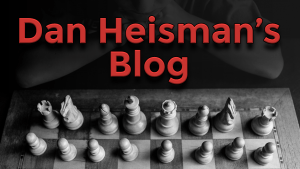When is Brilliance Helpful?
Every year we hold the charity Holly Heisman Memorial Tournament to raise money for women in need. Thanks to our organizers, the Ramachandras, our TD Joshua Anderson, and Howard Stern, who donates a trip to his studio which we auction off on EBay (coming up this October!), we have raised about $75,000 over the past 10 years. The Holly Heisman Memorial Fund is presided over by The Philadelphia Foundation.
A few years ago the following position occurred in the event. As usual, try to figure out what you would do in a slow game before proceeding:
b) Black has the advantage of the bishop pair (commonly just shortened to "the bishop pair", meaning that he has two bishops and his opponent does not - the average value of the bishop pair is about a half a pawn).
c) Black's king is safer
d) Black's army is much more active (more important than his also-stronger pawn structure).
In the diagram, Black does not have much incentive to look for, much less play, tricky moves like 1...Qe2. Tricky moves and complications are fantastic when you are losing and they give you chances to get back in the game. And grandmasters make a living finding clever moves when it looks like they are about even, but in fact they have some genius idea that shows that they really are winning. So if you are rated 2300+ and want to win with a flashy combintation to show everyone how good you are, we trust you can do it without much risk. But if you are already way ahead, then you have to be very careful that if you play something tricky, the one who will be tricked is not you! If you are not that good, you are taking a big risk by making "brilliant" but unncessary moves that raise the chances that you can miscalculate and throw it all way. When you have more to gain, that's when you want to be more careful, so the more ahead you are, the more careful you should be. Note that I am not saying the opposite, that when you are way ahead you should play very defensively and passively - that's not usually good either. But the "normal" middle ground should be sufficient.
In this case, Black should play the "normal" 1...Rd1, offering not just a rook trade, but creating big back-rank problems for White. This move is not only much simpler, but it is obviously much stronger. Even if 1...Qe2 worked, it probably was unnecessary. It's great to show everyone how smart you are, but it's also good sometimes to show everyone how wise you are by avoiding unnecessarily "smart" moves. 
PS: If you would like to make a tax-deductible contribution to one of my charitable funds, follow the directions at http://danheisman.home.comcast.net/~danheisman/Main_Chess/donations.htm. Thanks!






